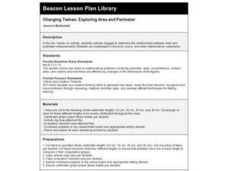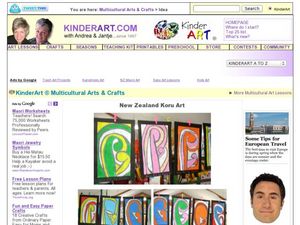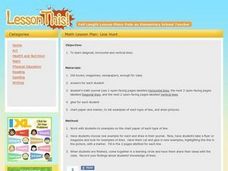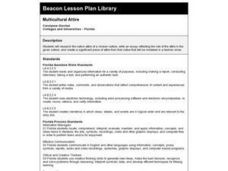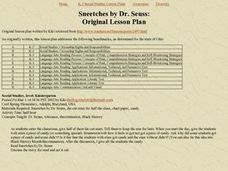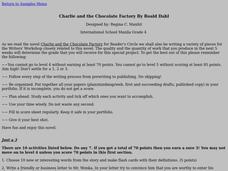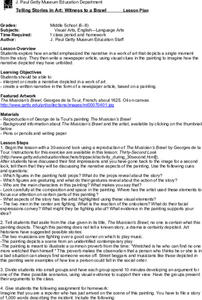Curated OER
Changing Twines: Exploring Area and Perimeter
Third graders review formulas for area and perimeter in quadrilaterals. They arrange pre-cut twine on a centimeter graph paper to create non-congruent quadrilaterals. They calculate the perimeter and area of each form.
Curated OER
Navigating the Straits
Students research the players and events that have influenced U.S.-China relations since World War II, with specific emphasis on the two countries' relationships with Taiwan. They write a briefing paper, advising the president on the...
Curated OER
Geo-Wrap Vests
First graders use geometric shapes to create and extend patterns. Students read a book and view African garments. They identify patterns in the garments. Students create and decorate a paper vest with geometric patterns.
Curated OER
Groundwater Pollution Lab
In this groundwater pollution worksheet, students use a piece of bread to represent the earth, food coloring to represent contaminants in the ground and water to simulate the movement of pollutants with water through the ground. Students...
Curated OER
Balancing Equations
Students practice balancing chemical equations using the trial and error method. In this balancing equations lesson plan, students use paper squares labeled with specific atoms to balance 5 given chemical equations.
Curated OER
A Polynomial Quilt
Tenth graders create polynomial quilts. In this polynomials lesson, 10th graders use concrete models, such as construction paper, to create various shapes described. Students use the FOIL method to multiply terms and to get a square...
Curated OER
Catapult Creations
Third graders design and build a catapult. In this lever lesson, 3rd graders collect a variety of lever type objects. Students build a catapult and launch marshmallows or crumpled paper and see who can hit the designated target.
Curated OER
New Zealand Koru Art
Students learn about and create koru art. In this cultural art lesson, students read M?ori legends and learn about M?ori koru designs. Students practice forming a koru shape, and, when ready,draw a large koru on cartridge paper using...
Curated OER
Cherokee Leaf Printing
Young scholars investigate their local creeks and forests and practice identifying trees. For this ecology identification lesson, students utilize a pad and pencil while on a field trip near their school and describe their trip...
Curated OER
Line Hunt
Students identify lines in everyday images. In this art analysis activity, students practice drawing diagonal, vertical and horizontal lines on pieces of chart paper. Students examine a page from a magazine and identify the...
Curated OER
Fiddling Around
Students look at a piece of art to make connections between early Baroque art and Baroque music. In this art and music lesson, students focus on the painting The Boy Violinist, by Hendrick Terbrugghen. They listen to the music to...
Curated OER
Size Riddles
Students investigate shapes and sizes by creating a riddle. For this geometry lesson, students read one of two books and investigate facts about an object's size. Students write a riddle using the facts they have read and cut...
Curated OER
Catherine, Called Birdy: June and July
Young scholars illustrate types of conflicts in Catherine, Called Birdy. In this Catherine, Called Birdy lesson, students take notes on four types of character conflict. Young scholars work in teams to illustrate a...
Curated OER
Fractions
First graders create fraction creatures by using 1 inch squares of construction paper. In this fractions lesson plan, 1st graders name the fractions within their whole creatures.
Curated OER
A City Lost and Found
Students hypothesize about the origins of the Incan lost city of Machu Picchu. They examine archaeological methodologies used by researchers to piece together the history of the site and create an audio tour of the location for visitors...
Curated OER
Multicultural Attire
Students research the native attire of a chosen culture, write an essay reflecting the role of the attire in the given culture, and create a significant piece of attire from that culture that be modeled in a fashion show.
Curated OER
Rewrite, Revise, Recycle
Learners examine different pieces of literature that have a similiar theme. They read an article about reusing ideas for television shows. They work together to create their own program proposals. They also create backstories for one of...
Curated OER
Sneetches by Dr. Seuss:
Students enter the classroom, half of them are given die-cut stars. They are told to keep the star for later. At the start of the day, the students with stars a piece of candy. Students brainstorm how it feels to get/not get a piece...
Curated OER
Charlie and the Chocolate Factory
Fourth graders read the novel Charlie and the Chocolate Factory for Reader's Circle, they also are writing a variety of pieces for the Writer's Workshop that is closely related to the novel. The quality and the quantity of work that...
Curated OER
Quilts
Students explore geometric shapes and patterns. They view the provided paper display of a quilt to identify geometric figures it contains. Afterwards, they draw and color their own quilt on a activity sheet.
Curated OER
Activity Plan 3-4: Still Life Artists
Students find that still life's are a great way to jump-start art. In this early childhood art lesson, students examine famous still life paintings, discuss still life art, and create their own still life piece.
Curated OER
Telling Stories in Art: Witness to a Brawl
Students examine how a piece of art tells a story. In this visual art lesson, students interpret a piece of art work by writing a newspaper article that tells the story of the moment in time that is depicted in a picture. They work with...
Curated OER
Weaving a Watercolor
Students examine the color wheel and work with watercolors. In this color lesson, students go over primary, secondary, and intermediate colors before watching a demonstration of watercolor brush techniques. They choose a shape to paint...
Curated OER
This Can't be a Plant
Students grow mold. In this science experiment lesson, students grow mold on different pieces of bread by adjusting the moisture, temperature, and light. They record the results to see which grows the most mold.
